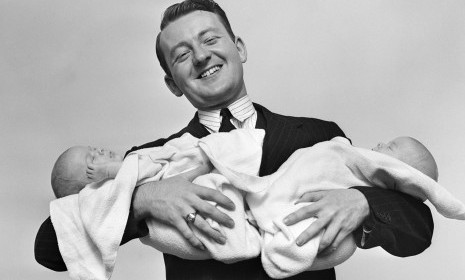Postpartum depression in men?
Researchers say 10.4 percent of new dads experience emotional lows — further complicating the parenting challenge

A free daily email with the biggest news stories of the day – and the best features from TheWeek.com
You are now subscribed
Your newsletter sign-up was successful
Postpartum depression is a distressingly common problem for new mothers, but a new study in the Journal of the American Medical Association makes the case that new fathers experience a parallel form of gloom — in their case, kicking in before the baby is born. Here's a quick look at what researchers discovered:
How common is depression among new dads?
James Paulson of the Eastern Virginia Medical School analyzed data from 43 previous studies (which had collectively examined 28,004 men), and concluded that about 10.4 percent suffered from depression between the first trimester of their wives' pregnancy and their babies' first birthdays. That's a little more than double the rate of depression among men, generally.
The Week
Escape your echo chamber. Get the facts behind the news, plus analysis from multiple perspectives.

Sign up for The Week's Free Newsletters
From our morning news briefing to a weekly Good News Newsletter, get the best of The Week delivered directly to your inbox.
From our morning news briefing to a weekly Good News Newsletter, get the best of The Week delivered directly to your inbox.
What's the theory?
A number of factors seem to come into play, including hormone changes (estrogen drops in women, and testerone drops in men when there's a new baby). But there are plenty of other possible culprits — loss of sleep, added responsibilities, and new economic stresses for starters, says Irene Levine, a psychiatry professor at New York University School of Medicine. In some cases, the moods of a new father can darken after his wife gets depressed. "Given the closeness of the marital relationship," Levine says, "it's not surprising for a dad to get post-baby blues."
When is the problem at its worst?
It peaks when the babies are 3- to 6-months-old (which is also, not surprisingly, when new fathers' sleep deprivation peaks). During that period, as many as a quarter of new fathers in the U.S. reported being depressed. Depression rates are higher in the U.S. — where paternal-leave policies are capped at three months — than abroad, where both parents typically get more time off from work.
A free daily email with the biggest news stories of the day – and the best features from TheWeek.com
How big a problem is this, really?
In most cases, the sadness passes as the new family reaches a new equilibrium. But men deal with depression differently than women, displaying more anger and irritability. That can lead to fits of aggression and violence, or impulsive behaviour such as gambling, extramarital affairs, or drug and alcohol abuse, says Will Courtenay, a psychotherapist in San Francisco who has researched postpartum depression in fathers. All this can be passed down — a British study found that children whose fathers are depressed have much higher rates of behavioral and psychiatric problems.
What do the researchers recommend?
That new dads are more carefully screened for depression, especially in cases where the mother is already suffering and joint therapy might be helpful.
Sources: JAMA, Wash. Post, ABC News, Globe & Mail, NY Daily News, The Telegraph